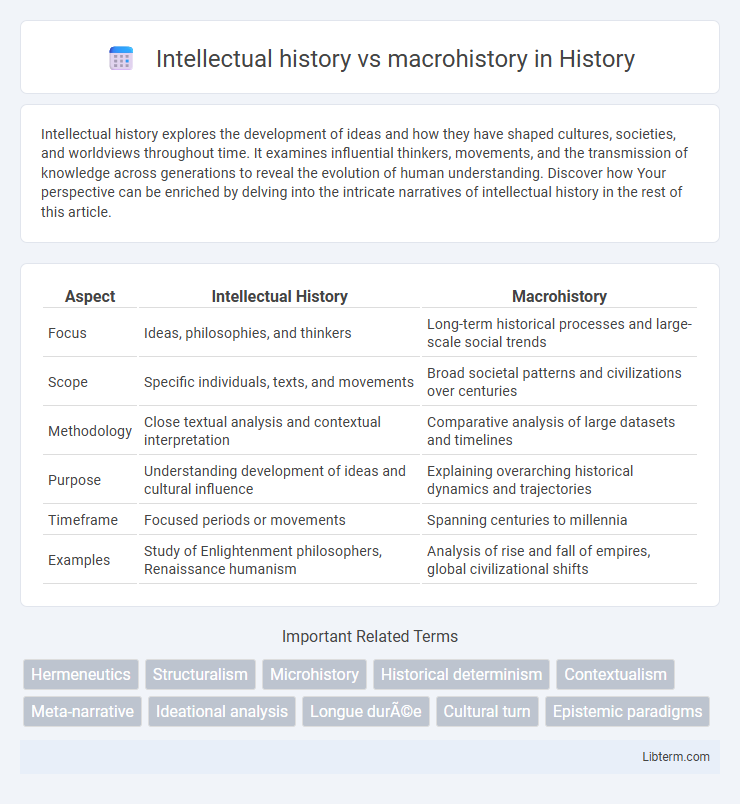Intellectual history explores the development of ideas and how they have shaped cultures, societies, and worldviews throughout time. It examines influential thinkers, movements, and the transmission of knowledge across generations to reveal the evolution of human understanding. Discover how Your perspective can be enriched by delving into the intricate narratives of intellectual history in the rest of this article.
Table of Comparison
| Aspect | Intellectual History | Macrohistory |
|---|---|---|
| Focus | Ideas, philosophies, and thinkers | Long-term historical processes and large-scale social trends |
| Scope | Specific individuals, texts, and movements | Broad societal patterns and civilizations over centuries |
| Methodology | Close textual analysis and contextual interpretation | Comparative analysis of large datasets and timelines |
| Purpose | Understanding development of ideas and cultural influence | Explaining overarching historical dynamics and trajectories |
| Timeframe | Focused periods or movements | Spanning centuries to millennia |
| Examples | Study of Enlightenment philosophers, Renaissance humanism | Analysis of rise and fall of empires, global civilizational shifts |
Defining Intellectual History
Intellectual history examines the evolution of ideas, philosophies, and cultural concepts through texts, speeches, and influential thinkers, emphasizing the context and meaning behind intellectual movements. Defining intellectual history involves tracing the genealogy of ideas and understanding how they shape societal developments and paradigms over time. In contrast, macrohistory focuses on large-scale historical patterns, structures, and processes, prioritizing broad societal changes over individual intellectual contributions.
Understanding Macrohistory
Macrohistory explores large-scale historical processes and patterns, emphasizing societal transformations over centuries or millennia. Intellectual history concentrates on ideas, philosophers, and cultural developments within specific timeframes. Understanding macrohistory involves analyzing broad trends such as economic cycles, demographic changes, and political revolutions to reveal the underlying forces shaping human civilization.
Core Objectives: Ideas vs. Broad Patterns
Intellectual history centers on tracing the development, influence, and transformation of ideas within specific cultural, philosophical, or political contexts. Macrohistory investigates large-scale historical patterns, structures, and processes that shape civilizations over extended periods. While intellectual history prioritizes the evolution and impact of thought, macrohistory emphasizes systemic changes and long-term trajectories in human societies.
Methodological Approaches Compared
Intellectual history employs a close analysis of texts, ideas, and the evolution of thought, emphasizing the contextual interpretation of philosophical, literary, and scientific concepts. Macrohistory utilizes large-scale, comparative frameworks to identify broad patterns and long-term structural changes across civilizations, often incorporating quantitative data and interdisciplinary methods. The methodological contrast lies in intellectual history's micro-level focus on discourse and meaning, whereas macrohistory adopts a macro-level approach integrating social, economic, and cultural variables to explain historical trajectories.
Key Figures in Intellectual History
Key figures in intellectual history include Michel Foucault, who emphasized the relationship between knowledge and power, and Quentin Skinner, known for his contextual approach to historical texts. Intellectual history focuses on the evolution of ideas, tracing philosophical, political, and scientific concepts through time, unlike macrohistory, which analyzes broad social structures and long-term historical processes. Other prominent scholars such as Isaiah Berlin and Arthur Lovejoy contributed to conceptual history, highlighting the importance of understanding intellectual frameworks shaping historical developments.
Influential Macrohistorians
Influential macrohistorians such as Arnold J. Toynbee, Oswald Spengler, and Fernand Braudel have shaped the study of large-scale historical processes by analyzing long-term social, economic, and cultural patterns across civilizations. Their works emphasize the rise and fall of civilizations, cyclical theories of history, and the structural dynamics of societies over centuries, contrasting with intellectual history's focus on ideas and thinkers. Macrohistory employs interdisciplinary methods combining history, sociology, and economics to uncover broad historical trends beyond individual intellectual developments.
Case Studies: Applying Each Perspective
Case studies in intellectual history emphasize analyzing influential ideas and thinkers shaping societal developments, revealing how philosophies and ideologies directly impacted cultural transformations. Macrohistory case studies explore broad structural forces and long-term patterns, such as economic cycles or demographic shifts, to understand overarching historical dynamics. Employing intellectual history enables nuanced interpretation of specific ideological changes, while macrohistory offers comprehensive insights into systemic trends affecting civilizations over centuries.
Strengths and Limitations of Each Field
Intellectual history excels in analyzing the development of ideas, philosophies, and cultural narratives with detailed focus on individual thinkers and their contexts, providing deep insights into the evolution of thought. Macrohistory prioritizes broad patterns and large-scale social, economic, and political trends over long periods, offering a comprehensive understanding of historical forces and cycles but often at the expense of nuanced individual and localized perspectives. While intellectual history may overlook wider societal impacts, macrohistory can underrepresent the complexity of ideas and intellectual movements that shape those larger trends.
Intersections and Interdisciplinary Insights
Intellectual history and macrohistory intersect by analyzing the evolution of ideas within broad socio-political and economic contexts, revealing how intellectual movements shape and are shaped by large-scale historical processes. Interdisciplinary insights emerge by combining philosophical analysis, cultural studies, and quantitative historical methods, enriching the understanding of ideological patterns and their impact on societal transformations over time. This synergy enhances the study of historical causality, highlighting the reciprocal influence between intellectual developments and macrohistorical trends.
Future Trends in Historical Analysis
Intellectual history increasingly integrates digital humanities and computational methods, enabling nuanced analysis of ideological developments over time. Macrohistory trends emphasize big data and global interconnectedness to identify patterns across civilizations and epochs, revealing systemic drivers of historical change. Future historical analysis will likely blend micro-level intellectual discourse with macro-level systemic frameworks, enhancing predictive models and interdisciplinary insights.
Intellectual history Infographic

 libterm.com
libterm.com